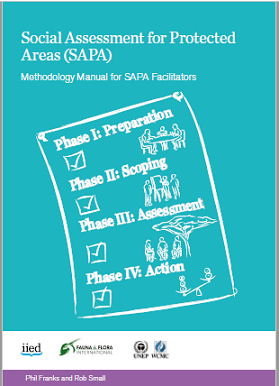
This manual provides detailed guidance for assessing the social impacts – benefits and costs – of protected areas (PAs) and related conservation and development activities, at the local level using the relatively simple and low cost Social Assessment for Protected Areas (SAPA) methodology. SAPA can be used with PAs of any kind, including PAs managed and governed by government agencies, communities and the private sector. It is a multi-stakeholder assessment for use by PA managers, communities living within and around the PA, other local level stakeholders, and supporting organisations at national level, to help increase and more equitably share positive social impacts, and reduce negative social impacts. Our assumption in developing the SAPA methodology is that the assessment will be proposed, planned and facilitated by these site-level users and this methodology manual is written for these users. In most cases there will be a need for technical support from an organisation at national or state level with social research expertise – for example an NGO, university or consultancy – especially for the household survey, but there should be no need for international consultants. The methodology uses a combination of i) community workshops to identify significant social impacts, ii) a short household survey to explore these impacts and related governance issues in more depth, and iii) stakeholder workshops to validate the survey results, explore other key issues and generate recommendations for action.














